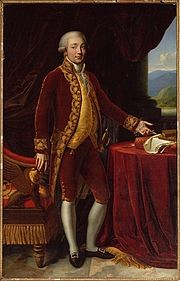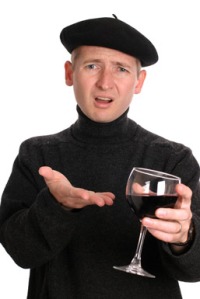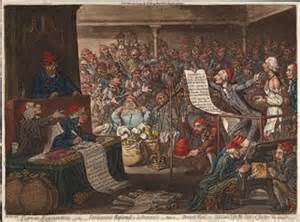It’s a story recently reawakened by George Lucas in the new Star Wars trilogy. The low-level political idealist who is in the right place at the right time to bring a promising republic crashing to the ground, as he assumes more and more power within the republic’s systems, eventually proclaiming himself Emperor, and renaming the republic he has taken in a similar fashion.
Most people know that George Lucas based a lot of the story in Star Wars on the Second World War, and the actions Palpatine (the evil emperor in Star Wars) took parallel those of real-life evil emperor Adolf Hitler, a man who has, in the modern day, become a symbol for all things anti-egalitarian and anti-democratic. Hell, look on your standard internet forum argument, and try and count how many posts before a person’s belief system is compared to Hitler or the Nazis.
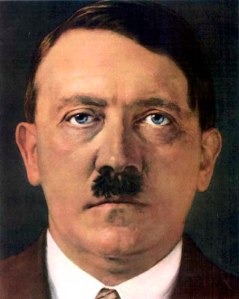
In reality, Hitler hated religion, tried to ban smoking, and promoted vegetarian ideals, while also promoting a system wherein corporations had absolute control over the state. He also firmly opposed gay-rights, and wanted to rid society of Jews, homosexuals, the insane and the disabled. He doesn’t fit in any modern party, and yet, all of them.
But who did Hitler base his rise off of? Well, contrary to Hitler’s general distaste for the Allied powers of the First World War, he actually did look to France for inspiration.
Well, yes and no, you see, Napoleon wasn’t from France proper. He was from Corsica, and even during Napoleon’s life time, Corsica went from French hands to Genoan hands (Genoa was a city-state in modern day Italy.) and back again. By the time Napoleon was old enough to enrol himself in a military academy, Corsica was under French domination.
Napoleon’s family were bankrupt aristocrats. They had become aristocrats after his father ‘embraced’ the invading French government, and became a court noble representing Corsica to King Louis XVI. But Napoleon’s father was a drunk and a gambler. Every time he remade a fortune through land-deals (mostly confiscating other people’s properties. Yeah, the ways of le Ancien Régime) he tended to gamble it away. Making, and losing, all his money in mainland France while his wife and children in Corsica rarely saw a Franc.
Perhaps this became a part of Napoleon’s interest in the military. He would build himself up, progress through the ranks, and work within the great social mobiliser of the late 18th century! The military! Which, even in absolutist France was a mix of aristocracy and meritocracy. Once he was in the academy, he focused on becoming an artillery officer. His fondness for artillery would show itself through all his later military campaigns. At the academy, he was mocked by his fellow officers for his ‘quaint’ Corsican accent and crude dialect of French.
Nonetheless, as France descended into civil war in 1789, Napoleon was ranked Second Lieutenant in an Artillery Regiment, and after the revolution began, took an extended leave to go home to Corsica, and join Corsican Nationalists in a riot against the French Army stationed in Corsica. Yes, the French Army in which Napoleon was a part. Napoleon’s punishment for his actions against the French Army? He gets promoted to Captain. After his promotion, he splits ranks with the Corsican Nationalists, and moves his family to mainland France, in 1793.
After this move to mainland France, Napoleon begins to suck up to the Robespierre family, who at this time were in power over the ‘Committee of Public Safety’. (Reign of Terror in progress here). He writes several pamphlets in favour of Robespierre, the Revolution, and a Republic. He also uses his artillery know-how to crush a rebellion in Toulon and scare the British Royal Navy away from a potential intervention. The Committee of Public Safety is impressed by Napoleon’s complete disregard for public safety, and put him in charge of France’s ‘Army of Italy’, and send him off to invade Italy.
Then Robespierre’s government collapses, and the new ‘Directory’ put Napoleon under house arrest. When the Royalists in France rebel against the National Assembly, the Directory remembers Napoleon’s actions in putting down the rebellion at Toulon, and bring him to face off against the Royalists. He does face off against them, with a cannon or two. Using ‘Grape Shot’, which is best described as the 18th and 19th century equivalent to a massive shot-gun, he kills 1,400 royalists, and sends the rest fleeing. The Directory conveniently forgets their previous condemnation of Napoleon’s relationship to the Robespierre family, and send him to Italy, again.
In Italy, he drives the Austrian Empire out of Lombard, and beats the Kingdom of Naples and the Papal States into submission. The Directory, filled with Atheists, desires for Napoleon to knock the Pope himself out of power. Napoleon withdraws, but not for any love of the Pope, per se, but rather because he feared the absence of the Papal authority in Italy would allow Naples to unify the Italian peninsula against France. This isn’t the last time Napoleon argues with the Directory.
During this time, Napoleon begins his press tour. Like Hitler, who wrote Mein Kampf to justify his rise, Napoleon was similarly gifted at using print to drive public opinion in his favour. He establishes two newspapers, and works to woo Talleyrand, France’s foreign advisor, in order to bring more high-ranking government officials into his corner.
Napoleon then invades Egypt under direction of the Directory. He reaches Jaffa, where he has men, women, and children alike murdered. His army begins to fall ill, and Horatio Nelson and the British Royal Navy defeat the French Navy at the Battle of the Nile. Napoleon begins his retreat from Egypt, and has all his injured or sick men killed in order to speed the retreat. Increasingly, Napoleon’s true colours are showing.
In France, the Directory’s fights with France’s neighbours and internal threats had weakened its power, and completely bankrupted the nation. They tried to pin the failed invasion of Egypt on Napoleon, calling him a deserter. Public opinion, however, was in Napoleon’s favour, as he was hailed a hero, despite the massive failure of his Egyptian campaign. He decides the best way to respond to the Directory’s accusations against him is to overthrow the Directory.
On 10 November, 1799, Napoleon and a regiment of Grenadiers enter the National Assembly, first accosting the Directory itself, and the ‘Council of Ancients’ and then proceeding to the Council of 500. Napoleon himself declares the Revolution over, and accuses the Assembly of destroying the Constitution. He declares himself and two of his supporters the ‘Consulates’ of France, and force decree after decree through the Senate.
He brings peace to France, the Revolutionary war does end in 1799, and France does rebuild. He rapidly expands and reorganises the French military. Putting France square as a world power again. He even manages to fight the Haitian revolutionaries to a standstill.
He sends French forces to the Netherlands, to establish the Batavian Republic. William Pitt the Younger, the British Prime Minister, tells Napoleon to evacuate French forces from the Netherlands and from Switzerland. Napoleon does not, and on 18 May, 1803, Britain declares war on France. Napoleon uses the conflict to his advantage, and holds an election in France, with the ballot question reading something like, ‘Do you think Napoleon should become emperor for life and defend France against any future revolutions and foreign invasions’? The public ‘voted’ yes, and Napoleon proclaims himself The Emperor of the French on 18 May 1804, giving himself absolute power. He reorganises France in a way truly ‘Enlightenment Era’ friendly, namely he reorganises France in the way the Roman Empire reorganised itself after the collapse of the Roman Republic.
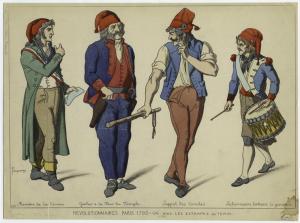
‘I feel like we could’ve learned how to prevent zis in some sort of class about previous world events’.
Of course, as this rearrangement finished, the world was at war, and France and France’s ‘interests’ were fighting brutal wars in South Asia, the East Indies, Africa, South/Central/North America, the Caribbean, and of course, Europe itself, in Spain, Germany/Austria, and Russia. (And don’t forget France’s Ally, the Ottoman Empire, waging war in the Middle East and Central Asia against Russia and Britain).
Say what you will about infamous persons in history such as Napoleon and Hitler, but they do start these major wars that mark decided shifts in eras. The Napoleonic War brought a swift and crashing end to the dynastic nature and social order of the world that had built itself into a very unstable tower in the 18th century, just as the Second World War would be the final death kneel for the Victorian social order over a hundred years later. In both cases, Hitler and Napoleon had poor tempers, and perhaps their poor tempers were because the social orders they were raised in were stacked against them. Hitler, the German Army grunt from Austria, Napoleon, the disgraced, poor, provincial, ‘noble’ from Corsica, which wasn’t French when Napoleon was born, and both had neglectful/absent fathers. Some of the parallels from Hitler and Napoleon’s life are far too sinister to overlook. Both men took advantage of economic, social, and political upheaval within the nation they adopted as their own. Both men had inferiority complexes that led to genocidal, regicidal, out-right homicidal tendencies. Both men became political mouth-pieces for their parties, and used their status as a veteran to win the good favour of their countrymen. Both men became the leaders of democracies, and then swiftly ended anything democratic about said democracies.
On the 23rd of June, 1940, the day after France surrendered its Army, Navy, and colonial possessions to Nazi Germany, Adolf Hitler visited the tomb of Napoleon Bonaparté. He left the site, grinning, saying it was the grandest moment of his life. He then ordered the remains of Napoleon’s son be moved from Vienna to Napoleon’s side in Paris, in tribute to Napoleon.
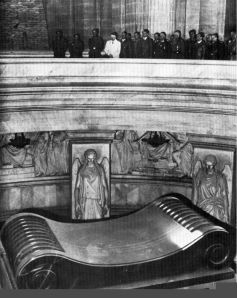
I suppose if you’re a power hungry dictator willing to plunge the entire world into war in order to achieve your means, this becomes hallowed ground.
One has to wonder how much of himself Hitler saw in Napoleon, or even if Hitler had modelled himself after the French dictator.
History is stranger than fiction.
‘History repeats itself because no one was listening the first time’. – Abraham Lincoln
